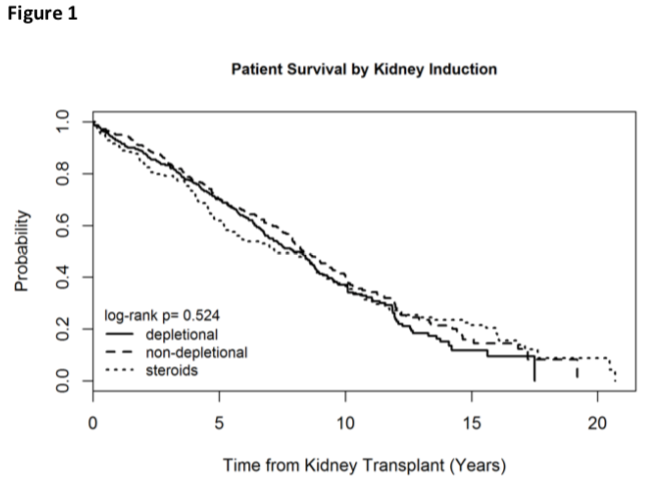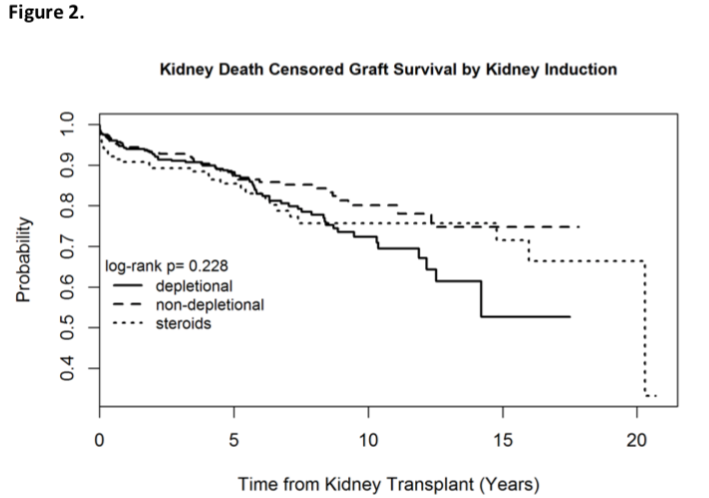Induction Type Does Not Influence Kidney Graft or Patient Survival in Recipients with a Previous Heart Transplant in the United States
1Medicine, University of Minnesota, Minneapolis, MN, 2Complex Care Analytics, Fairview Health Services, Minneapolis, MN
Meeting: 2019 American Transplant Congress
Abstract number: B200
Keywords: Heart transplant patients, Induction therapy, Kidney transplantation, Outcome
Session Information
Session Name: Poster Session B: Kidney Immunosuppression: Induction Therapy
Session Type: Poster Session
Date: Sunday, June 2, 2019
Session Time: 6:00pm-7:00pm
 Presentation Time: 6:00pm-7:00pm
Presentation Time: 6:00pm-7:00pm
Location: Hall C & D
*Purpose: Induction regimens for kidney transplant (KT) in heart recipients vary widely among transplant centers. We sought to examine the impact of kidney induction type on kidney graft and patient survival in KT recipients with a previous heart transplant utilizing the Scientific Registry of Transplant Recipients (SRTR).
*Methods: Adults with primary KT up to 12/31/2015 who had a previous heart-alone transplant were included. The induction type used before the kidney engraftment grouped recipients into 3 groups: depletional, non-depletional, and steroids only. We excluded 41 subjects from multivariate analysis due to a non-standard heart-induction regimen. Kaplan-Meier curves were generated to show time to death and kidney failure following KT. Multivariate Cox PH regression was used to evaluate these outcomes, with transplant center included as a random effect. These models were adjusted for kidney and heart induction, recipient and donor age, time between transplants, cause of heart failure, OPTN status for heart transplant, blood type, LVAD at heart transplant and DM at time of kidney transplant. The patient survival model was stratified by heart induction and excluded time between transplants due PH violations.
*Results: There were 858 kidney transplant recipients after heart transplant (KTAH) in our cohort. At the time of the kidney engraftment, 356 received depletional induction, 348 received non-depletional induction, and 154 received steroids only. At the time of the heart engraftment, 157 received depletional induction, 47 non-depletional induction, and 613 had no induction for their heart transplant. There was no difference in recipient survival (fig. 1) or death-censored kidney allograft survival (fig. 2) by kidney induction type. Results were similar in the Cox PH models. An increased time from heart to kidney transplant was associated with a decreased risk of kidney failure following kidney transplant (HR 0.95, 95% CI 0.91, 0.99, p=0.02) for a one year increase.
*Conclusions: Type of kidney induction did not influence patient or kidney graft survival following kidney transplant for those with a previous heart transplant. Non-depletional or steroid alone regimens should be the preferred choice. Validating these findings prospectively may be helpful to inform the choice of induction regimens in (KTAH) recipients given the differences in cost and risk of infection associated with each of the regimens.
To cite this abstract in AMA style:
Riad SM, Tamas A, Jackson S, Martin C. Induction Type Does Not Influence Kidney Graft or Patient Survival in Recipients with a Previous Heart Transplant in the United States [abstract]. Am J Transplant. 2019; 19 (suppl 3). https://atcmeetingabstracts.com/abstract/induction-type-does-not-influence-kidney-graft-or-patient-survival-in-recipients-with-a-previous-heart-transplant-in-the-united-states/. Accessed February 15, 2026.« Back to 2019 American Transplant Congress


